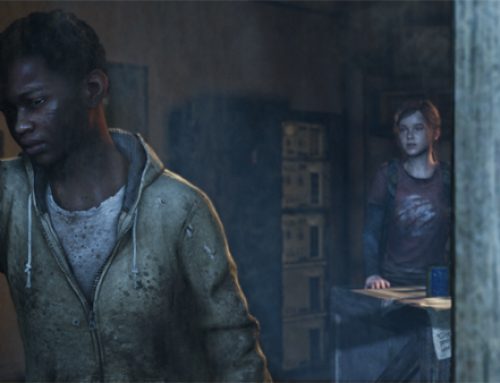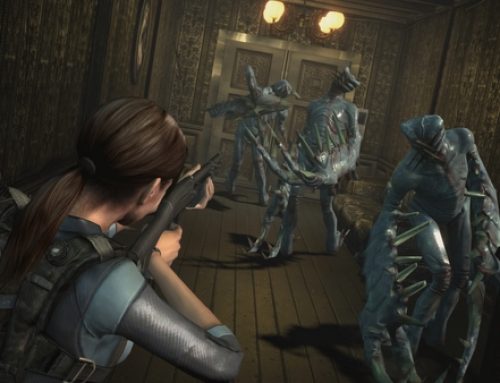While the popularity of the Wii and the success of music titles and online first-person shooters have helped make 2008 the Year of Social Gaming, sometimes you want to spend a few hours alone in a deep, immersive world, without sitting in an online lobby or coordinating strategy with a bunch of foul-mouthed 14-year-olds. For those days, there’s “Fallout 3,” Bethesda Softworks’ epic, single-player hybrid of role-playing game and first-person shooter.
You play as a young man or woman who’s lived an entire childhood in Vault 101, an underground fallout shelter that escaped the ravages of a late 21st-century nuclear war between the United States and China.
In the coolest, most inventive tutorial in gaming, you’ll witness your own birth and start play as a baby, when you’ll take your first steps and interact with objects. (My favorite touch? Your character’s baby talk when you push the A button to speak.) At your 10th birthday party, you’ll learn how to fire a gun and receive the Pip-Boy 3000, an oversized wristwatch/PDA that you use to keep tabs on your stats and inventory. Next, you’ll play as a 16-year-old, taking a multiple-choice test designed to figure out which skills you’ll focus on.
After that, the training wheels come off, and you’re a confused 19-year-old, trying to track down your father (voiced by Liam Neeson) after he leaves the vault for the burned-out wasteland in and around Washington, D.C.
Once you exit Vault 101, there’s a whole world of options in front of you. You’ll spend a good deal of the game following in the footsteps of your scientist dad, but you can more or less carry out the game’s core missions at your own pace. In between, you can blow up a small town, steal the Declaration of Independence, collect rare soda for an obsessed cola fiend or help establish a colony for freed slaves.
My own favorite quest involved trying to put an end to epic battles between a self-styled supervillain and her army of giant ants and a would-be superhero and his crew of robots. The game’s level cap and freedom to be as good or evil as you like practically guarantee you won’t finish every quest on your first play-through. It’s a great way to encourage you to begin anew once you’ve wrapped things up, with a brand new skill set and markedly different outlook on the characters you’ll meet.
The elaborate, varied quests make “Fallout 3” (rated M, $50 on PC, $60 on Xbox 360 or PlayStation 3) a must-play title for anyone with a few dozen hours to invest. But the presentation is also first-rate.
The Capital Wasteland is as brilliantly realized a game world as you’ll find, particularly in light of the fact that you’re its lone unscripted inhabitant. From the humorous, self-appointed “democratically elected” ruler of the Republic of Dave to idealistic DJ Three Dog, many members of “Fallout 3’s” supporting cast feel as fleshed out as characters from feature films. The care that obviously went into crafting each character is helped out tremendously by the game’s first-rate voice acting. After Bethesda’s last game, “The Elder Scrolls IV: Oblivion,” was knocked for leaning too heavily on a core group of actors, the studio went out and expanded its roster of talent, which makes “Fallout 3” feel like a higher-budget, more polished title than the epic “Oblivion.”
Visually, the nuke-blasted landscape’s heat-seared beauty dovetails perfectly with the retrofuturist, Raygun Gothic industrial design and old timey soundtrack of tunes from the ’30s, ’40s and ’50s. With its pre-rock ‘n’ roll tunes, green-screened PCs, analog mainframes, advanced robotics and personnel-sized nuclear weapons, “Fallout 3’s” universe feels simultaneously futuristic and outdated. Your weaponry runs a gamut from mininukes and plasma pistols to bolt-action rifles, baseball bats and crude, homemade dart guns.
Whatever your weapon of choice, you’ll quickly learn to appreciate V.A.T.S., the Vault-Tec Assisted Targeting System that’s built into your Pip-Boy. V.A.T.S. allows you to target your attacks to a specific part of your enemy’s body, and the strikes are executed for you. Your character has a certain number of “action points” to use in combat, based upon your agility. Once you’ve exhausted them all, they’ll regenerate slowly, and you’re free to take evasive action or just blast away unassisted while the meter refills. This mechanic makes for a great mixture of first-person shooter and role-playing game conventions. Less-experienced gamers who struggle with the PS3 and 360’s dual-analog-stick style controllers can choose their spots without being punished, while veteran FPS players can ignore V.A.T.S. altogether if they find it makes things too easy. Other game designers would do well to emulate this inclusive approach.
“Fallout 3” isn’t perfect. My pet peeve was that characters treat you the same no matter your appearance. Everyone seems to know whether you’re good or evil as you travel the wastes, but no one reacts much to how you look, or the characters who accompany you. This is particularly notable with one character who offers to join you late in the game if you’ve chosen a moral path. This character’s very appearance by your side ought to cause pretty much everyone to comment, if not shoot at you. Yet no one says anything. Additionally, that same companion has the ability to greatly affect the game’s final moments, yet basically sits by the sidelines and watches everything unfold, totally contrary to her behavior earlier in the game.
Similarly, during one side quest, a woman advises you to undergo reconstructive surgery to your face so that you can see what it’s like to live inside another person’s skin. Yet everyone talks to you as if nothing ever happened. The facial reconstruction literally makes no difference at all. Bethesda’s decision to so obviously and awkwardly highlight the game’s biggest limitation is a head-scratcher, like a supermodel deciding to circle her lone zit with a red marker, rather than cover it with make-up. Granted, every open-world game script to date has failed to account for all the cool stuff you can do, but “Fallout 3’s” memorable characters, inventive quests and fully realized world make the narrative gaps appear that much wider.
This stuff is small potatoes compared to the polish and craft of the rest of “Fallout 3.” If you enjoy PC gaming and have a decent rig, buy the PC version for the inevitable fan-created levels and modifications that console gamers won’t get to enjoy. If you’re trying to decide between 360 and PS3 versions, bear in mind that the PS3 won’t be getting the downloadable add-ons coming early next year to the 360 and PC versions.




